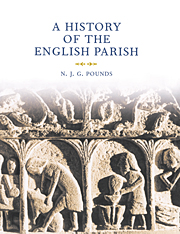Book contents
- Frontmatter
- Contents
- List of illustrations
- Preface
- List of abbreviations
- PART I THE ORIGINS OF THE PAROCHIAL SYSTEM
- PART II THE FUNCTIONS OF THE PARISH
- 5 The parish and its servants
- 6 The economics of the parish
- 7 The parish and the community
- 8 The parish and the church courts: a mirror of society
- 9 The parish church, popular culture and the Reformation
- PART III THE PARISH AND ITS CHURCH
- Notes
- Index
8 - The parish and the church courts: a mirror of society
Published online by Cambridge University Press: 29 July 2009
- Frontmatter
- Contents
- List of illustrations
- Preface
- List of abbreviations
- PART I THE ORIGINS OF THE PAROCHIAL SYSTEM
- PART II THE FUNCTIONS OF THE PARISH
- 5 The parish and its servants
- 6 The economics of the parish
- 7 The parish and the community
- 8 The parish and the church courts: a mirror of society
- 9 The parish church, popular culture and the Reformation
- PART III THE PARISH AND ITS CHURCH
- Notes
- Index
Summary
… the number of persons whom they [the
church courts] were able to prosecute was
far greater than that of comparable secular
jurisdictions, namely the Assizes and the
Quarter sessions.
J. A. VageTo ignore the courts and their work is to lose
a substantial part of the life of the ordinary
Elizabethan … The courts were, in fact, the
moral policemen of the time.
C. I. A. RitchieThe courts christian, which continued to operate in England from the twelfth century until their extinction by statute in the nineteenth, constitute one of the most complex and confusing aspects of legal history. The law which they applied took cognisance of two types of cases. The first involved only the clergy and was based on the canon law which was developing during the eleventh and twelfth centuries. The clergy became amenable to lay jurisdiction only for treason and, by contrast, minor misdemeanours. In every other respect they were subject only to the church courts. The second concerned the laity in a range of activities, both spiritual and secular, ranging from testamentary and probate, through matrimonial and divorce, to sexual offences of every kind. The church also claimed jurisdiction over such matters as affray, if committed in a church or a cemetery (p. 477); over slander, usury and any and every offence which might have been conducive to social friction. The law aimed to maintain a spirit of ‘love and charity’ amongst the faithful.
- Type
- Chapter
- Information
- A History of the English ParishThe Culture of Religion from Augustine to Victoria, pp. 291 - 324Publisher: Cambridge University PressPrint publication year: 2000

